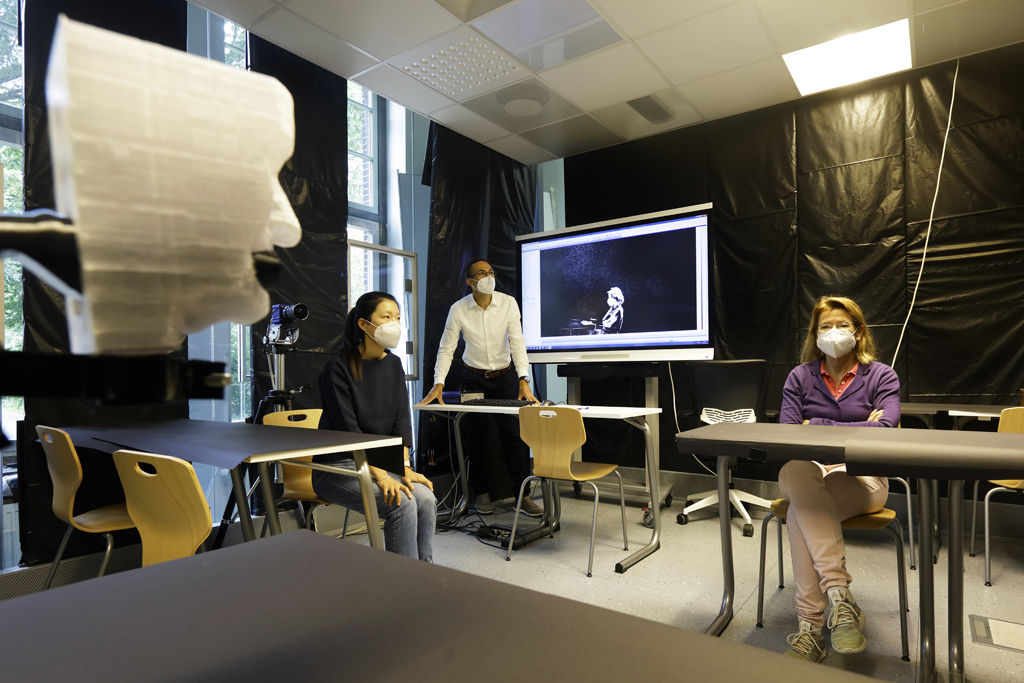The debate about the role of aerosols in corona infections has been going on for some time, but now 39 scientists argue in Science for mandatory improved ventilation.
Philo Bluysen (right) during an experiment on the indoor spread of aerosols. (Photo: TU Delft)
The production of drinking water is subject to strict rules, the Food and Consumer Product Safety Authority watches over everything you put in your mouth and the sewage system is also strictly regulated. Historically, infectious diseases have always been the reason to improve hygiene by tightening up regulations.
It is now time for the corona pandemic to have the same effect on ventilation systems, say 39 scientists in a joint article entitled A paradigm shift to combat indoor respiratory infection published in the scientific journal Science. They draw a parallel with the Sanitary Report of 1842 in Victorian England that was the beginning of drinking water installations and the construction of sewer systems.
Now it is time to ensure that the air inside buildings contains significantly fewer pathogens, just as we can expect clean and safe water to flow from the tap, say the researchers from countries including Australia, the United States, China, the United Kingdom, Singapore and the Netherlands.
Hybrid ventilation`
Professor of Indoor Environment Prof. Philo Bluyssen (Faculty of Architecture) is the TU Delft voice in the group. Last year, she was one of the signatories of a letter to the World Health Organisation (WHO) drawing attention to the third infection route of the coronavirus: aerosols through the air. In comparison with saliva droplets and contact transmission, which are addressed by keeping distance, using face masks or washing hands, too little attention is paid to aerosols that float around freely for a long time, they wrote.
‘Ventilation is now seen mainly as a cost item. But look what this pandemic is costing us‘
Ventilation regulations are often limited to the number of litres of fresh air per person, in which the CO2 concentration is often used as an indicator. According to the researchers, filtration and disinfection of the air is rarely an issue except in hospital facilities.
“Ventilation, including filter systems and monitoring, should no longer be seen as something you just add to a building. It has to be cleverly integrated,” says Bluyssen. “New buildings should always include hybrid ventilation. That means that you have natural ventilation as a basis, but that you can add mechanical ventilation when and where it is needed. Ventilation is now seen mainly as a cost item. But look what this pandemic is costing us!”
Building code
The indoor climate will only improve when the WHO recognises the danger of spreading pathogens in buildings, the researchers write. Only then will countries develop their own standards and award ventilation certificates to installations that meet the higher standards. Won’t that be extremely expensive? “Improving your ventilation certainly means an investment,” acknowledges co-author Dr Marcel Loomans, indoor climate specialist at TU Eindhoven. “You will also use more energy, for example. But on the total cost of a building, the amount is small, and it generates a lot of benefits to society as a whole. Apart from this pandemic, poor air quality in buildings affects our health so I hope that the issue of ventilation stays on the agenda even after corona, and that it will be embedded in the Building Code.”
-
Also watch:
Video TU Delft TV on making aerosol dispersion visible
-
Read also: Ventilation guidelines insufficient against corona
Do you have a question or comment about this article?
j.w.wassink@tudelft.nl


Comments are closed.